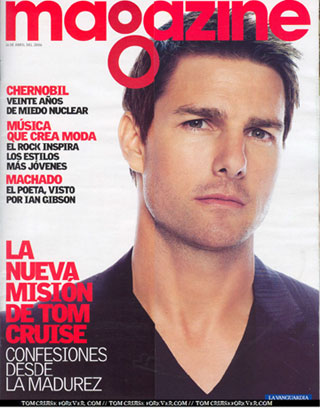


LOS ANGELES - He can hop on couches, denounce psychiatry and pooh-pooh postpartum depression — and his supernova Hollywood heat doesn't cool a whit.
Tom Cruise has been box-office gold since his first starring role in 1983's "Risky Business." His 23rd starring vehicle, "Mission: Impossible III," opening next week, is a lock to add to that luster.
Cruise isn't just a major movie star. He's mastered the elusive art of staying hot in Hollywood.
It's a difficult achievement.
Stars have to stay in the public eye, experts say, but not to the point of overexposure. They have to choose unexpected roles, but not so unexpected that they alienate fans. They need to reveal parts of their off-screen personality, but not so much (at least in most cases) that they seem freakish or out of touch.
"It's easy to become an overnight star today," says veteran talent manager Bernie Brillstein. "The toughest thing is keeping stardom."
Those who should know don't agree about how to do that. Some say positive publicity is key, others say it's all about picking the right flicks. Some say talent matters, others insist it's all about marketing.
"Talent and role choice are most important," says Peter Bart, editor of Variety, the Hollywood trade paper. "You can have tremendous publicity, but if you make one lousy movie after another, you're not going to get your price."
And an actor's salary, he says, "is more important than sex."
Sometimes, though, an actor agreeing to a lesser salary can be an excellent move toward enduring stardom.
Though Cruise is known for his big-budget action flicks, his role in 1999's "Magnolia" was perfect for showing off his acting chops, says Anne Thompson, deputy film editor for the trade paper The Hollywood Reporter.
"It's not about the money or the marquee," she says. "It's about stretching and showing what he can do. He's keeping his eye on both things, and all the good, successful actors do that."
George Clooney is another performer who amplified his star power with a combination of roles in movies large and small, Thompson says.
"He recognizes that the big payday is less important than creating and doing work that will stand the test of time," she says. "He has to do the big commercial films like `Oceans Eleven,' but he certainly came out ahead with smaller films that were really very risky to make."
But veering too far from what fans want can backfire, says John Wilson, founder of the Golden Raspberry Awards, which recognize the worst in film each year.
"They have to find that very narrow space where the public knows what to expect but they're not bored that you keep meeting their expectations," he says. "It's hard to stay true to what made you a star and not just wear it out."
Wanting more than his usual turned Jamie Foxx from a comedian and comic actor into a superstar. Playing Ray Charles in 2004's "Ray" earned him an Oscar and rocketed him to the A-list, notes pop culture professor Todd Boyd of the University of Southern California.
"A lot of it is luck," Boyd says. "You need to play the right role at the right time."
Stars also need to "work the media" for staying power, says publicist Michael Sands. Hollywood is fickle, he says, and popularity ups and downs are reflected in salary levels.
Regular appearances in entertainment magazines are a must, Sands says, and stars fare best when they share parts of their personal lives.
"The public likes to be involved in the celebrity's life, even if it's just from a glossy vantage point," he says.
Establishing an emotional connection with fans is critical to lasting popularity, says Henry Schafer, executive vice president of Marketing Evaluations, Inc., which has compiled its Q-scores familiarity ratings of performers, personalities and brand names for more than 40 years.
Fans will forgive all kinds of transgressions, such as drug addiction or infidelity, so long as stars are willing to admit their foibles, he says.
"You can be an icon and at the same time be touchy-feely," Schafer says. "Those are the people who stay on the top and those are the ones who are consistently liked."
For example, even though Cruise may be a "polarizing personality," Schafer says, sharing his thoughts on television and in magazines helps create "an emotional response that people want to feel."
Industry analyst James Ulmer disagrees. Too many episodes of personal weirdness (or couch-hopping) can take the shine off a star, he says.
"(Cruise) has some vulnerability because of his compromised behavior on the TV screen," Ulmer says. "That kind of thing wears against his gold-plated image."
Some experts say overexposure is a sure career-killer.
"It's possible to be so in the public's face that they just want you to go away," Wilson adds.
"Great talent used to be the currency," says longtime publicist Michael Levine. "Today it's great PR."
That's the problem, says Brillstein.
Today's paparazzi targets "are not stars, they're celebrities," he says. "Stars are people who stay around and who are serious about their work. You stay a star by being a star."
Cruise's longtime producing partner, Paula Wagner, says the actor's endurance comes from his work ethic and all-consuming passion for the job.
"He's devoted to his work. He's totally professional and loves what he does," she says. "I'm proud to say he's the top movie star in the world."